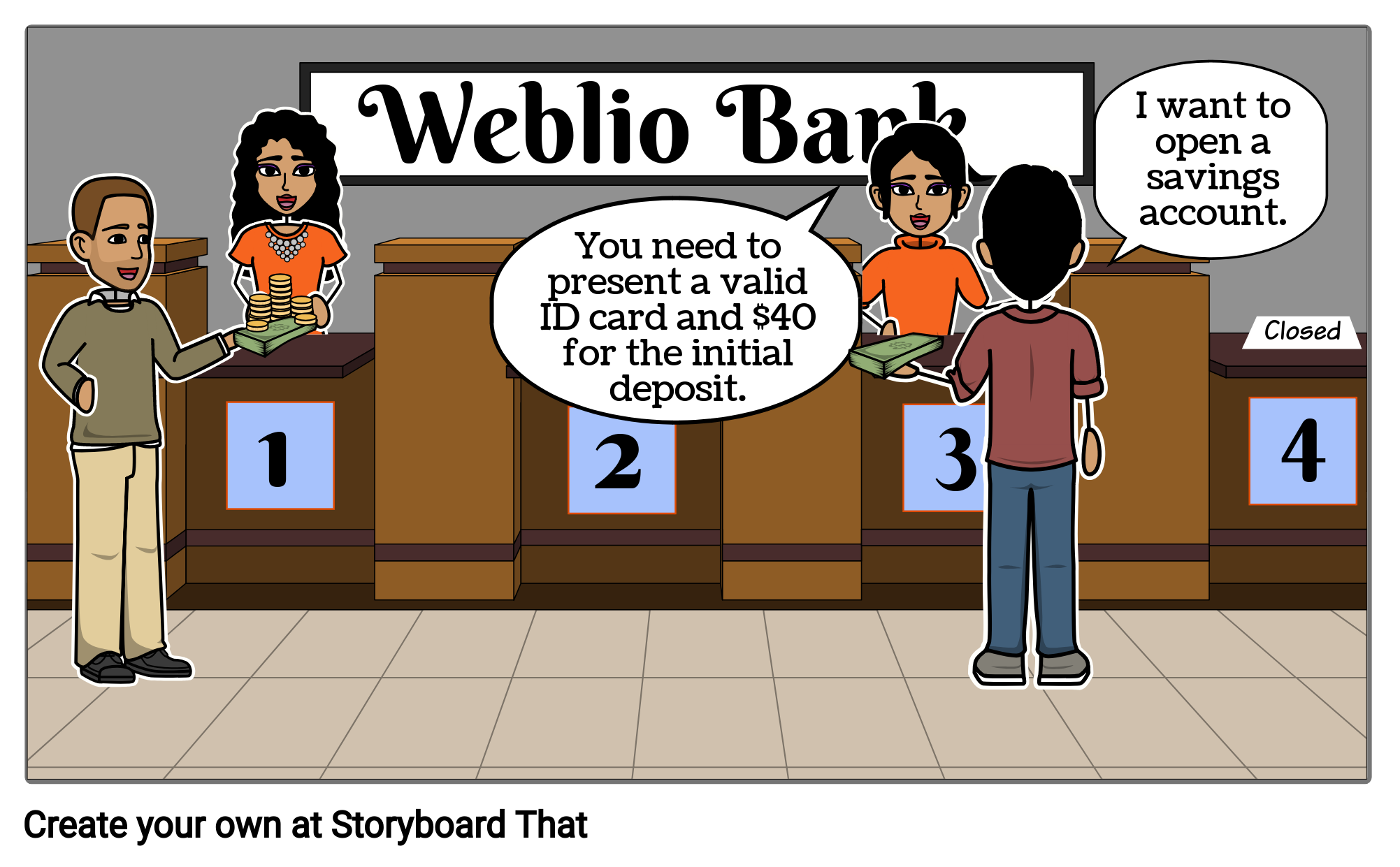LESSON GOAL
Let’s check our lesson goal.
In this material, you will learn the words and phrases that are used when you talk about saving, investing, and personal finance and express your opinions about specific topics.
In this material, you will learn the words and phrases that are used when you talk about saving, investing, and personal finance and express your opinions about specific topics.
この教材では、貯金や投資に関連した語彙や表現を学び、特定の話題について意見を述べる練習をします。
PART A_1
Please study the picture below. Then, describe it in as much detail as you can.
PART A_2

| Answer: | |
| . |
PART A_3
Now, let me ask you a question about the picture.
PART A_4
| 1. | Why is the man handing money to the woman at counter 3? |
| Answer: |
PART A_5
Now, let us review your answers.
(Please review your student’s answers by sending the correct answers in complete sentences. After that, ask your student to read aloud his or her corrected answers.)
PART A_6
Choose the correct meaning of the underlined word in each sentence.
PART A_7
| 1. | The economy is growing fast. |
| a. | [noun] something on sale at a lower price than its true value |
| b. | [noun] a person whose job is to receive and pay out money |
| c. | [noun] the system by which a country produces and uses goods and money |
| 2. | His credit record is good. |
| a. | [noun] money on one’s bank account |
| b. | [noun] an amount of money saved, collected, or provided for a particular purpose |
| c. | [noun] a helpful or good effect |
| 3. | They want to invest three million dollars in the new project. |
| a. | [verb] to secretly collect a lot of money or objects |
| b. | [adjective] to the largest degree possible |
| c. | [verb] putting money into something to make a profit |
| 4. | She makes a huge profit by teaching photography. |
| a. | [noun] money that people use to start a business |
| b. | [noun] money earned from selling goods and services |
| c. | [noun] a place, especially a large building, for storing things |
| 5. | We purchased the concert tickets one month in advance. |
| a. | [verb] to buy something |
| b. | [verb] to give something to someone else in return for money |
| c. | [noun] money saved in a bank |
PART A_8
Now, let us review your answers.
(Please review your student’s answers by sending the correct answers in complete sentences. After that, ask your student to read aloud his or her corrected answers.)
PART B_1
Please construct your own sentences using the following words.
PART B_2
| 1. | purchase | Answer: | . | |
| 2. | economy | Answer: | . | |
| 3. | profit | Answer: | . | |
| 4. | invest | Answer: | . | |
| 5. | credit | Answer: | . |
PART B_3
Now, let us review your answers.
(Please review your student’s answers by sending the correct answers in complete sentences. After that, ask your student to read aloud his or her corrected answers.)
PART C_1
Please complete each sentence by choosing the correct answer in the box below.
PART C_2
| credit | purchase | profit |
| invest | economy | debit |
| 1. | He ____________ money in real estate. |
| 2. | A decrease in tourism may have a serious effect on the ____________. |
| 3. | He sold his car at a huge ____________. |
| 4. | An insurance is needed when ____________ a house. |
| 5. | I currently don’t have enough ____________. |
PART C_3
Now, let us review your answers.
(Please review your student’s answers by sending the correct answers in complete sentences. After that, ask your student to read aloud his or her corrected answers.)
PART D_1
Let’s talk. Please answer the questions by stating your opinions.
PART D_2
| 1. | Some people say that it is good to do the things that you want because you can always save money. What do you think about that? |
| Answer: | |
| 2. | People should start investing at a young age. Do you agree or disagree? |
| Answer: |
PART E_1
Now, I will ask you the following questions. You may ask questions, too.
PART E_2
| 1. | How important is saving money? |
| Answer: | |
| 2. | Do you think saving money at a bank is safe? |
| Answer: | |
| 3. | What do you think are the advantages of saving? |
| Answer: | |
| 4. | Do you think everyone should invest their money in something? |
| Answer: | |
| 5. | What do you think are the advantages of investing money? |
| Answer: | |
| 6. | What do you think are the disadvantages of investing money? |
| Answer: | |
| 7. | Do you think that it is better to purchase items in cash? |
| Answer: |
REVIEW AND FEEDBACK
Now, let us review the things that you learned in this lesson.
ではこのレッスンで学んだことを振り返りましょう。
(Please give a short feedback on how your student did on your class.)
| Grammar 文法 |
Pronunciation 発音 | Vocabulary 単語 |
Comprehension 理解 |
|
|---|---|---|---|---|
 GOOD GOOD |
文法の誤りはほとんどなく、完全な文章で話すことができる | ほとんどの単語をはっきりと正しく発音することができる | 習った表現を適切に使うことができる | 文章を理解し、質問に正しく答えることができる |
 FAIR |
文法の誤りはあるが、完全な文章で話すことができる | 発音の練習が必要な言葉がいくつかある | たまにミスはあるが、習った表現を適切に使うことができる | 文章を完全に理解するのは難しく、質問に正しく答えられないときもある |
 POOR |
文章で話すのは難しく、単語だけで話すことができる | 発音の練習が必要である | 習った単語と表現を少しだけ使うことができる | 文章を理解するのは難しく、質問に答えるのは難しい |
レッスン教材に関するアンケートのお願い
レッスン教材の改善・拡充を図ることを目的とし、アンケートを実施しております。
以下のURLからアンケートにお答えいただき、 ご意見・ご要望をお聞かせください。
アンケートはこちら